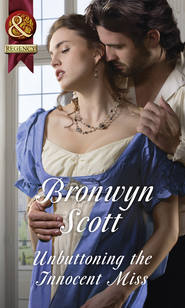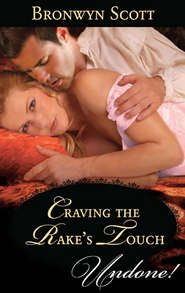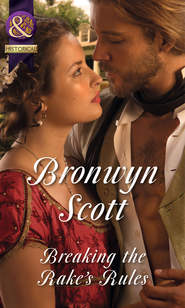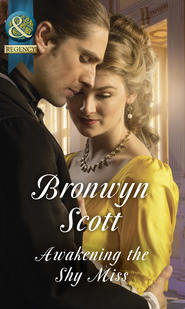По всем вопросам обращайтесь на: info@litportal.ru
(©) 2003-2024.
✖
Prince Charming in Disguise
Автор
Год написания книги
2019
Настройки чтения
Размер шрифта
Высота строк
Поля
Prince Charming in Disguise
Bronwyn Scott
Prince George and Caroline of Ansbach, 1704.He may be the future King of England, but Prince George seeks a marriage that’s more than a mere political alliance. Masquerading as a lowly nobleman, George heads to the court of Ansbach to woo the renowned beauty, Caroline!Caroline has no knowledge that he’s the most sought-after bachelor in Europe. But however much she’s charmed by the mysterious gentleman, her duty is to accept a blue-blooded proposal… Still, she cannot deny she’s wickedly tempted by his red-hot proposition!
Prince Charming in Disguise
Bronwyn Scott
www.millsandboon.co.uk (http://www.millsandboon.co.uk)
Prince George and Caroline of Ansbach, 1704
He might be the future King of England, but Prince George seeks a marriage that’s more than a mere political alliance. Masquerading as a lowly nobleman, George heads to the court of Ansbach to woo the renowned beauty, Caroline!
Caroline has no knowledge that he’s the most sought-after bachelor in Europe. But however much she’s charmed by the mysterious gentleman, her duty is to accept a blue-blooded proposal… Still, she cannot deny she’s wickedly tempted by his red-hot proposition!
A brief guide to players and terms:
King Frederick of Prussia: previously the Elector of Brandenberg before becoming King of Prussia in 1701, he is the official guardian of Caroline of Ansbach. His court is in Berlin. He is married to Sophia-Charlotte, Caroline’s greatest mentor.
Queen Sophia-Charlotte: previously the Electress of Brandenberg before becoming queen. Married to Frederick, she is mentor and substitute mother to Caroline. She took on responsibility for Caroline when Caroline was eleven. Queen Charlotte’s court of intellectuals gathers at Lutzenberg Palace just outside Berlin. Her husband spared no expense for the creation of this gathering place.
Sophia, Dowager Electress of Hanover: related to all the relevant players in this story. She is the granddaughter of James I. After Queen Anne, she is the closest Protestant claimant to the English throne, hence the succession through her line to George I and II. She is mother to Sophia-Charlotte and to the Elector of Hanover (George I) and grandmother to George Augustus (George II). She is well acquainted with Caroline, and is the first to suggest George marry Caroline, although she is not involved in any of the actual planning.
The Elector of Hanover: later to become King George I, father to George II.
William of Ansbach: the Margrave of Ansbach and brother to Caroline. William and Caroline were both children of John of Ansbach from his second marriage.
The Duke of Celle: George Augustus’s maternal grandfather.
Margrave: a title that dates back to medieval times and is given to a governor (usually military) or lord of a border province in Germany. It is also used as a ‘hereditary title’ for certain princes in the Holy Roman Empire. In the case of William of Ansbach, the title is hereditary. He became margrave after the death of his father and his older stepbrother.
Elector: a member of the German electoral college in charge of electing the emperor of the Holy Roman Empire (previously known as the Roman king). Very early in the organization of the Germanic tribes, the position of elector was indeed elected from the tribes. However, by the days of George I the position had become hereditary and was passed from father to son. Heirs to the electors were called electoral princes. By all accounts the title ‘elector’ was highly respected and came with great power. An elector outranks a margrave, in case anyone was wondering.
Contents
Chapter One
Chapter Two
Chapter Three
Chapter Four
Chapter Five
Chapter Six
Chapter Seven
Chapter Eight
Chapter Nine
Author Note
About the Author
Chapter One
Herrenhausen Palace, Hanover, Germany, autumn 1704
Kings, even future kings, could be a lot of things but not refused. Yet it seemed Hedwig Sophia, the Dowager Duchess of Holstein-Gottorp, had done just that.
‘She has declined a proposal from the future King of England?’ a flare of characteristic temper mingled with disbelief in young Prince George’s voice, his dismay evident in the slouch of his posture as he collapsed inelegantly into a chair. Not all of his dismay was over the refusal. Most of it was over having come from the delectable Lady Marie-Thérèse’s warm and accommodating bed.
One thought kept running through his head: He’d given up a bout of morning lovemaking for this? Who did the duchess think she was to refuse him? He had excellent prospects these days. It wasn’t merely his own arrogance that suggested such a conclusion, it was empirically true. He’d always been assured of succeeding his father as the Elector of Hanover, but now his prospects were settled far beyond that, his future ascension to the British throne assured thanks to Queen Anne.
Aging and wanting to ensure there would be no more Catholics on the English throne, Queen Anne had decreed the throne would pass to George’s grandmother, Sophia, the Dowager Electress of Hanover, by right of her being James I’s granddaughter and a Protestant. After her, the throne would go to his father and eventually to him.
He was a king-in-waiting, and while he waited, his wife would have the privilege of being called the Princess of Wales, the first one to bear that title in two hundred years. That alone would be an honour, to say nothing of the title his wife would bear later: queen consort.
It would have been enough for any number of the eager women in the Hanover Court. He didn’t exactly lack for female companionship in or out of the bedchamber.
Yet it apparently wasn’t enough for the Dowager Duchess of Holstein-Gottorp. George fished in the pocket of his waistcoat for a miniature he carried of her. He’d stopped by his chambers for it on a last-minute whim when he’d received the summons. He knew the envoy from the duchess was here. He’d been expecting good news. It had seemed a nice touch to have her picture on him at the moment of acceptance. It would make a romantic gesture to pull out the miniature, an intimate detail for the envoy to convey back to the dowager duchess about George’s reaction upon hearing the glorious news.
To his mind, the decision was au fait accompli. Not only was Hedwig Sophia a dowager duchess, she was the daughter of Charles IX of Sweden, a princess in her own right. She of all people knew the power of what marriage to him offered.
When he’d arrived at his father’s study, the envoy had gone. His father had looked at him with steady eyes and delivered the news. She had declined the match.
‘Who does she think she’ll get better than me?’ George groused, spearing his father with a hard look. Usually he and his father disagreed on most points. But on this, they’d been fairly aligned. His father’s own unhappiness in marriage had spurred a desire to see his son’s marriage better settled.
George gave the cased miniature a flip and studied the portrait inside. The dowager duchess was pretty enough with her dark hair and dark eyes. Both features upheld her reputation for intelligence. She’d already born one son before her husband had seen fit to die, freeing her of what was rumoured to have been an unhappy marriage to which she had not freely consented.
By no means was he in love with her. Love before marriage had no real place in a political alliance, and usually didn’t have a place afterwards. But he was certain she would have been a credit to him and, in turn, he believed in his own arrogance that marriage to a young, attractive man like himself would have been far less of a nuisance than her prior husband.
George’s father shrugged a shoulder. ‘I would not perceive her refusal as a personal criticism. The envoy mentioned there are other contenders for her hand. From the way he spoke of them, I do not think she means to marry again, not you or anyone else. She’s too busy enjoying herself with a young noble at the Swedish court. But it’s unlikely she means to marry him either.’
Well, so be it. George shut the miniature with a forceful click. As with many things in his life, he was most concerned with events from his point of view. He was nearly twenty-five, and the heir to Great Britain part aside, he needed a wife, preferably one that he liked at least a little. Ideally, one that he liked a lot. It would have surprised his father to know the thoughts running through his son’s mind at the moment. He might have grown up knowing the expectations of a political marriage but that didn’t stop him from acquiring expectations of his own. Surely, some affection, some mutual regard, was possible.
George stood and tugged at his waistcoat, pulling himself together. What was done was done. Hedwig Sophia had refused. ‘I thank you for informing me, Father. It’s time to move forward from this and start thinking afresh about who might suit.’ He gave his father a short bow and exited.
The prospect of returning to Marie-Thérèse had diminished in light of the news. He wanted to be alone, to think about what had happened and what he’d do next. A walk in the gardens would help clear his mind and re-establish a sense of clarity. He was level-headed enough to understand this: his disappointment over the refusal stemmed from the obstacle it created, not from any fond affection. He’d never met the dowager duchess. All he knew of her was contained in reports from diplomats and the small miniature. He was merely disappointed that his goal of marriage had been thwarted.
Having embraced the idea of marrying, George was set on seeing it accomplished with his usual dogged determination. Once he’d committed to a concept, he was seldom swayed from his course whether it was the wisest or not.
George stopped by a fountain to watch the rhythmic trickle of water into the basin. Soon it would be winter and the fountain would freeze until spring. Not unlike his marital expectations, he thought wryly. It would take at least the winter to search out another alliance.
He threw back his head and laughed at his own impatience. It was something of a revelation to him that, future king or not, he was no different from other men of his age, full of the fires and passions of youth. From the lowest farmer to the most powerful ruler, every man had an empire to rule and that empire was the one he created himself—his family.
Bronwyn Scott
Prince George and Caroline of Ansbach, 1704.He may be the future King of England, but Prince George seeks a marriage that’s more than a mere political alliance. Masquerading as a lowly nobleman, George heads to the court of Ansbach to woo the renowned beauty, Caroline!Caroline has no knowledge that he’s the most sought-after bachelor in Europe. But however much she’s charmed by the mysterious gentleman, her duty is to accept a blue-blooded proposal… Still, she cannot deny she’s wickedly tempted by his red-hot proposition!
Prince Charming in Disguise
Bronwyn Scott
www.millsandboon.co.uk (http://www.millsandboon.co.uk)
Prince George and Caroline of Ansbach, 1704
He might be the future King of England, but Prince George seeks a marriage that’s more than a mere political alliance. Masquerading as a lowly nobleman, George heads to the court of Ansbach to woo the renowned beauty, Caroline!
Caroline has no knowledge that he’s the most sought-after bachelor in Europe. But however much she’s charmed by the mysterious gentleman, her duty is to accept a blue-blooded proposal… Still, she cannot deny she’s wickedly tempted by his red-hot proposition!
A brief guide to players and terms:
King Frederick of Prussia: previously the Elector of Brandenberg before becoming King of Prussia in 1701, he is the official guardian of Caroline of Ansbach. His court is in Berlin. He is married to Sophia-Charlotte, Caroline’s greatest mentor.
Queen Sophia-Charlotte: previously the Electress of Brandenberg before becoming queen. Married to Frederick, she is mentor and substitute mother to Caroline. She took on responsibility for Caroline when Caroline was eleven. Queen Charlotte’s court of intellectuals gathers at Lutzenberg Palace just outside Berlin. Her husband spared no expense for the creation of this gathering place.
Sophia, Dowager Electress of Hanover: related to all the relevant players in this story. She is the granddaughter of James I. After Queen Anne, she is the closest Protestant claimant to the English throne, hence the succession through her line to George I and II. She is mother to Sophia-Charlotte and to the Elector of Hanover (George I) and grandmother to George Augustus (George II). She is well acquainted with Caroline, and is the first to suggest George marry Caroline, although she is not involved in any of the actual planning.
The Elector of Hanover: later to become King George I, father to George II.
William of Ansbach: the Margrave of Ansbach and brother to Caroline. William and Caroline were both children of John of Ansbach from his second marriage.
The Duke of Celle: George Augustus’s maternal grandfather.
Margrave: a title that dates back to medieval times and is given to a governor (usually military) or lord of a border province in Germany. It is also used as a ‘hereditary title’ for certain princes in the Holy Roman Empire. In the case of William of Ansbach, the title is hereditary. He became margrave after the death of his father and his older stepbrother.
Elector: a member of the German electoral college in charge of electing the emperor of the Holy Roman Empire (previously known as the Roman king). Very early in the organization of the Germanic tribes, the position of elector was indeed elected from the tribes. However, by the days of George I the position had become hereditary and was passed from father to son. Heirs to the electors were called electoral princes. By all accounts the title ‘elector’ was highly respected and came with great power. An elector outranks a margrave, in case anyone was wondering.
Contents
Chapter One
Chapter Two
Chapter Three
Chapter Four
Chapter Five
Chapter Six
Chapter Seven
Chapter Eight
Chapter Nine
Author Note
About the Author
Chapter One
Herrenhausen Palace, Hanover, Germany, autumn 1704
Kings, even future kings, could be a lot of things but not refused. Yet it seemed Hedwig Sophia, the Dowager Duchess of Holstein-Gottorp, had done just that.
‘She has declined a proposal from the future King of England?’ a flare of characteristic temper mingled with disbelief in young Prince George’s voice, his dismay evident in the slouch of his posture as he collapsed inelegantly into a chair. Not all of his dismay was over the refusal. Most of it was over having come from the delectable Lady Marie-Thérèse’s warm and accommodating bed.
One thought kept running through his head: He’d given up a bout of morning lovemaking for this? Who did the duchess think she was to refuse him? He had excellent prospects these days. It wasn’t merely his own arrogance that suggested such a conclusion, it was empirically true. He’d always been assured of succeeding his father as the Elector of Hanover, but now his prospects were settled far beyond that, his future ascension to the British throne assured thanks to Queen Anne.
Aging and wanting to ensure there would be no more Catholics on the English throne, Queen Anne had decreed the throne would pass to George’s grandmother, Sophia, the Dowager Electress of Hanover, by right of her being James I’s granddaughter and a Protestant. After her, the throne would go to his father and eventually to him.
He was a king-in-waiting, and while he waited, his wife would have the privilege of being called the Princess of Wales, the first one to bear that title in two hundred years. That alone would be an honour, to say nothing of the title his wife would bear later: queen consort.
It would have been enough for any number of the eager women in the Hanover Court. He didn’t exactly lack for female companionship in or out of the bedchamber.
Yet it apparently wasn’t enough for the Dowager Duchess of Holstein-Gottorp. George fished in the pocket of his waistcoat for a miniature he carried of her. He’d stopped by his chambers for it on a last-minute whim when he’d received the summons. He knew the envoy from the duchess was here. He’d been expecting good news. It had seemed a nice touch to have her picture on him at the moment of acceptance. It would make a romantic gesture to pull out the miniature, an intimate detail for the envoy to convey back to the dowager duchess about George’s reaction upon hearing the glorious news.
To his mind, the decision was au fait accompli. Not only was Hedwig Sophia a dowager duchess, she was the daughter of Charles IX of Sweden, a princess in her own right. She of all people knew the power of what marriage to him offered.
When he’d arrived at his father’s study, the envoy had gone. His father had looked at him with steady eyes and delivered the news. She had declined the match.
‘Who does she think she’ll get better than me?’ George groused, spearing his father with a hard look. Usually he and his father disagreed on most points. But on this, they’d been fairly aligned. His father’s own unhappiness in marriage had spurred a desire to see his son’s marriage better settled.
George gave the cased miniature a flip and studied the portrait inside. The dowager duchess was pretty enough with her dark hair and dark eyes. Both features upheld her reputation for intelligence. She’d already born one son before her husband had seen fit to die, freeing her of what was rumoured to have been an unhappy marriage to which she had not freely consented.
By no means was he in love with her. Love before marriage had no real place in a political alliance, and usually didn’t have a place afterwards. But he was certain she would have been a credit to him and, in turn, he believed in his own arrogance that marriage to a young, attractive man like himself would have been far less of a nuisance than her prior husband.
George’s father shrugged a shoulder. ‘I would not perceive her refusal as a personal criticism. The envoy mentioned there are other contenders for her hand. From the way he spoke of them, I do not think she means to marry again, not you or anyone else. She’s too busy enjoying herself with a young noble at the Swedish court. But it’s unlikely she means to marry him either.’
Well, so be it. George shut the miniature with a forceful click. As with many things in his life, he was most concerned with events from his point of view. He was nearly twenty-five, and the heir to Great Britain part aside, he needed a wife, preferably one that he liked at least a little. Ideally, one that he liked a lot. It would have surprised his father to know the thoughts running through his son’s mind at the moment. He might have grown up knowing the expectations of a political marriage but that didn’t stop him from acquiring expectations of his own. Surely, some affection, some mutual regard, was possible.
George stood and tugged at his waistcoat, pulling himself together. What was done was done. Hedwig Sophia had refused. ‘I thank you for informing me, Father. It’s time to move forward from this and start thinking afresh about who might suit.’ He gave his father a short bow and exited.
The prospect of returning to Marie-Thérèse had diminished in light of the news. He wanted to be alone, to think about what had happened and what he’d do next. A walk in the gardens would help clear his mind and re-establish a sense of clarity. He was level-headed enough to understand this: his disappointment over the refusal stemmed from the obstacle it created, not from any fond affection. He’d never met the dowager duchess. All he knew of her was contained in reports from diplomats and the small miniature. He was merely disappointed that his goal of marriage had been thwarted.
Having embraced the idea of marrying, George was set on seeing it accomplished with his usual dogged determination. Once he’d committed to a concept, he was seldom swayed from his course whether it was the wisest or not.
George stopped by a fountain to watch the rhythmic trickle of water into the basin. Soon it would be winter and the fountain would freeze until spring. Not unlike his marital expectations, he thought wryly. It would take at least the winter to search out another alliance.
He threw back his head and laughed at his own impatience. It was something of a revelation to him that, future king or not, he was no different from other men of his age, full of the fires and passions of youth. From the lowest farmer to the most powerful ruler, every man had an empire to rule and that empire was the one he created himself—his family.











